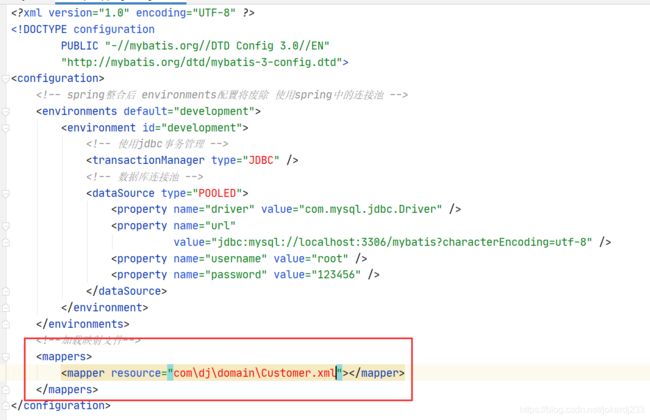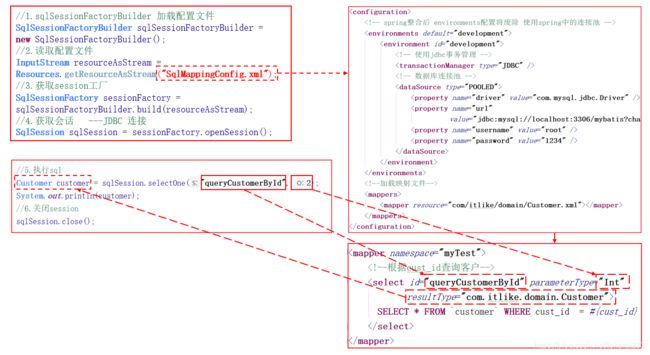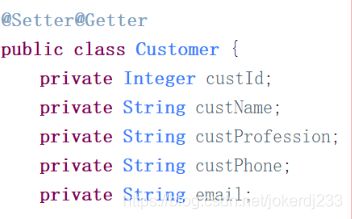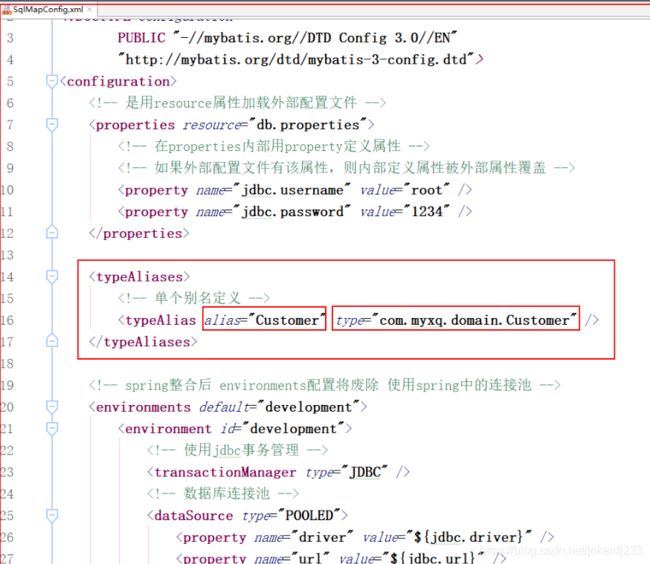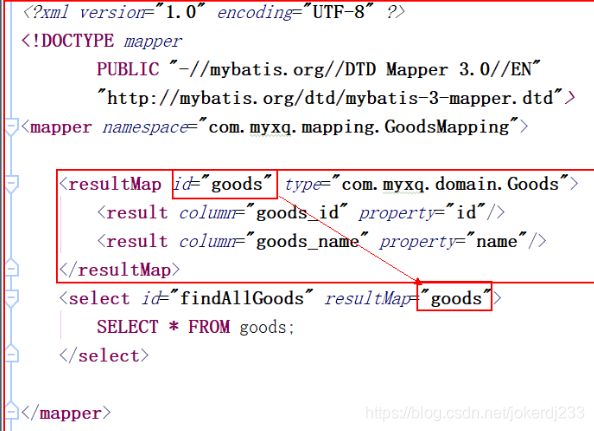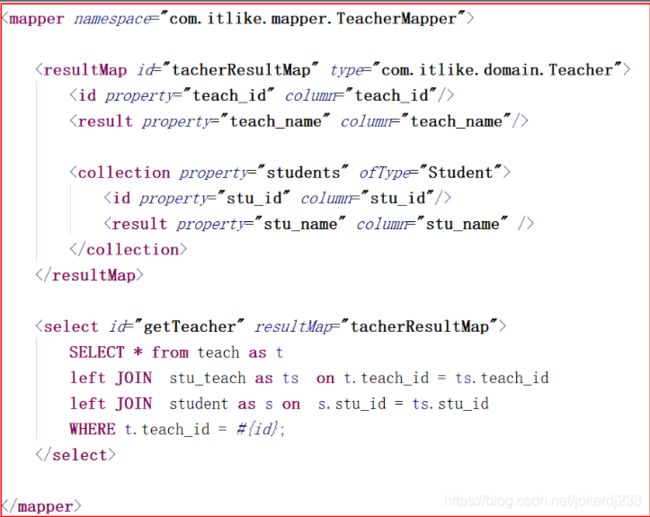Mybatis+SSM整合
Mybatis学习笔记
- 简介
-
- MyBatis作用
- 历史
- 为什么要使用MyBatis?
-
- JDBC
- Hibernate
- Mybatis
- MyBatis入门程序
-
- 1. 创建 jar工程
- 2. 导入jar包
- 3. 创建数据库
- 4. 建立关系映射类pojo
- 5. 创建核心配置文件SqlMappingConfig.xml
- 6.创建与表对象的关系映射Mapping文件编写sql语句
- 7. 在核心配置文件当中引入Mapping
- 8.创建工厂,执行sql语句
- MyBatis核心Api
-
- SqlSessionFactoryBuilder
- SqlSessionFactory
- SqlSession
- MyBatis架构
- mybatis封装工具类查询所有用户
- MyBatis-查询
-
- 查询所有用户
- 配置sql打印
- 模糊查询Like
- 参数介绍
-
- #{}和${}
-
- 1. #{}:
- 2. ${}
- 保存更新删除
-
- 添加客户
- 返回添加过后自增的主键
- 更新操作
- 删除操作
- MyBatis开发DAO
-
- 原始Dao开发方法
- Mapper动态代理
-
-
- selectOne和selectList
-
- 参数传递
-
- 单个参数
- 多个参数
- @param命名参数
- Map
- MaBatis核心配置文件
-
- properties
- settings
- typeAliases
- typeHandlers
- Plugins
- Environments
-
- Environment子标签
- databaseIDProvider
- mappers
- 输出类型
-
- 输出简单类型
- Map
- resultMap
- 多表操作
-
- ManyToOne
- OnToMany
- ManyToMany
- 动态sql
-
- 什么是动态sql
-
- . if标签
- Where标签
- trim标签
- choose标签
- foreach标签
- bind标签
- Sql片段
- 缓存
-
- 一级缓存
-
- 缓存介绍
- 一级缓存
- 一级缓存失效
- 二级缓存
-
- 二级缓存介绍
- 二级缓存使用步骤
- 逆向工程
-
- MyBatis Generator
- 分页插件
- SSM整合
-
- spring与springMVC
- 添加Mybatis
- SSM配置文件总结
-
- pom.xml
- web.xml
- application-mvc.xml
- applicationContext.xml
- db.properties
- sqlMapConfig.xml
简介
官方文档:链接
MyBatis作用
- MyBatis 是支持定制化 SQL、存储过程以及高级映射的优秀的持久层框架。
- MyBatis 避免了几乎所有的 JDBC 代码和手动设置参数以及获取结果集。
- MyBatis可以使用简单的XML用于配置和原始映射,将接口和Java的POJO类映射成数据库中的记录
- 使开发者只需要关注 SQL 本身,而不需要花费精力去处理例如注册驱动、创建connection、创建statement、手动设置参数、结果集检索等jdbc繁杂的过程代码。
历史
- 原是apache的一个开源项目iBatis
- 2010年6月这个项目由apache software foundation 迁移到了google code,并且改名为MyBatis 。
- iBATIS一词来源于“internet”和“abatis”的组合,是一个基于Java的持久层框架。
为什么要使用MyBatis?
JDBC
- SQL夹在Java代码块里,耦合度高导致硬编码内伤
- 维护不易且实际开发需求中sql是有变化,频繁修改的情况多见
- 要自已创建connection、创建statement、手动设置参数、结果集检索等
Hibernate
- 长难复杂SQL,对于Hibernate而言处理也不容易
- 内部自动生产的SQL,不容易做特殊优化。
- 基于全映射的全自动框架,javaBean存在大量字段时无法只映射部分字段。导致数据库性能下降。
Mybatis
- 对开发人员而言,核心sql还是需要自己优化
- MyBatis是一个半自动化的持久化层框架。
- MyBatis 是支持定制化 SQL、存储过程以及高级映射的优秀的持久层框架。
MyBatis入门程序
1. 创建 jar工程
2. 导入jar包
3. 创建数据库
/*
Navicat MySQL Data Transfer
Source Server : itlike
Source Server Version : 50720
Source Host : localhost:3306
Source Database : mybatis
Target Server Type : MYSQL
Target Server Version : 50720
File Encoding : 65001
Date: 2018-12-04 14:13:49
*/
SET FOREIGN_KEY_CHECKS=0;
-- ----------------------------
-- Table structure for customer
-- ----------------------------
DROP TABLE IF EXISTS `customer`;
CREATE TABLE `customer` (
`cust_id` int(11) NOT NULL AUTO_INCREMENT,
`cust_name` varchar(255) DEFAULT NULL,
`cust_profession` varchar(255) DEFAULT NULL,
`cust_phone` varchar(255) DEFAULT NULL,
`email` varchar(255) DEFAULT NULL,
PRIMARY KEY (`cust_id`)
) ENGINE=InnoDB AUTO_INCREMENT=11 DEFAULT CHARSET=utf8;
-- ----------------------------
-- Records of customer
-- ----------------------------
INSERT INTO `customer` VALUES ('1', '鲁班', '射手', '13499887733', '[email protected]');
INSERT INTO `customer` VALUES ('2', '李白', '刺客', '18977665521', '[email protected]');
INSERT INTO `customer` VALUES ('3', '阿轲', '刺客', '18977665997', '[email protected]');
INSERT INTO `customer` VALUES ('4', '德玛西亚', '肉盾', '13700997665', 'demaxiya.126.com6');
INSERT INTO `customer` VALUES ('5', '亚索', '战士', '13586878987', '[email protected]');
INSERT INTO `customer` VALUES ('6', '奶妈', '辅助', '13398909089', '[email protected]');
INSERT INTO `customer` VALUES ('7', '剑圣', '刺客', '13398909088', '[email protected]');
INSERT INTO `customer` VALUES ('8', '盖伦', '肉盾', '15923242231', '[email protected]');
INSERT INTO `customer` VALUES ('9', '锤石', '辅助', '13398908900', '[email protected]');
INSERT INTO `customer` VALUES ('10', '阿木木', '辅助', '13398908928', '[email protected]');
4. 建立关系映射类pojo
@Getter@Setter//Lombok插件
public class Customer {
private Integer cust_id;
private String cust_name;
private String cust_profession;
private String cust_phone;
private String email;
@Override
public String toString() {
return "Customer{" +
"cust_id=" + cust_id +
", cust_name='" + cust_name + '\'' +
", cust_profession='" + cust_profession + '\'' +
", cust_phone='" + cust_phone + '\'' +
", email='" + email + '\'' +
'}';
}
}
5. 创建核心配置文件SqlMappingConfig.xml
<?xml version="1.0" encoding="UTF-8" ?>
<!DOCTYPE configuration
PUBLIC "-//mybatis.org//DTD Config 3.0//EN"
"http://mybatis.org/dtd/mybatis-3-config.dtd">
<configuration>
<!-- spring整合后 environments配置将废除 使用spring中的连接池 -->
<environments default="development">
<environment id="development">
<!-- 使用jdbc事务管理 -->
<transactionManager type="JDBC" />
<!-- 数据库连接池 -->
<dataSource type="POOLED">
<property name="driver" value="com.mysql.jdbc.Driver" />
<property name="url"
value="jdbc:mysql://localhost:3306/mybatis?characterEncoding=utf-8" />
<property name="username" value="root" />
<property name="password" value="123456" />
</dataSource>
</environment>
</environments>
</configuration>
6.创建与表对象的关系映射Mapping文件编写sql语句
<?xml version="1.0" encoding="UTF-8" ?>
<!DOCTYPE mapper
PUBLIC "-//mybatis.org//DTD Mapper 3.0//EN"
"http://mybatis.org/dtd/mybatis-3-mapper.dtd">
<mapper namespace="myTest">
<!--根据cust_id查询客户-->
<select id="queryCustomerById" parameterType="Int" resultType="com.dj.domain.Customer">
SELECT * FROM `customer` WHERE cust_id = #{cust_id}
</select>
</mapper>
7. 在核心配置文件当中引入Mapping
<!--加载映射文件-->
<mappers>
<mapper resource="com\dj\domain\Customer.xml"></mapper>
</mappers>
8.创建工厂,执行sql语句
![]()
public class Test01 {
@Test
public void test() throws IOException {
//1.SqlSessionFactoryBuilder 加载配置文件
SqlSessionFactoryBuilder sqlSessionFactoryBuilder = new SqlSessionFactoryBuilder();
//2.读取配置文件
InputStream resourceAsStream = Resources.getResourceAsStream("SqlMappingConfig.xml");
//3.获取session工厂
SqlSessionFactory build = sqlSessionFactoryBuilder.build(resourceAsStream);
//4.创建会话 --JDBC链接
SqlSession sqlSession = build.openSession();
//5.执行sql语句
Customer queryCustomerById = sqlSession.selectOne("queryCustomerById", 1);
//6.打印信息
System.out.println(queryCustomerById);
//7.关闭会话
sqlSession.close();
}
}
MyBatis核心Api
SqlSessionFactoryBuilder
- SqlSessionFactoryBuilder用于创建SqlSessionFacoty
- SqlSessionFacoty一旦创建完成就不需要SqlSessionFactoryBuilder了
- 因为SqlSession是通过SqlSessionFactory创建的
- 所以可以将SqlSessionFactoryBuilder当成一个工具类使用,最佳使用范围是方法范围即方法体内局部变量。
SqlSessionFactory
- 创建sqlSession的工厂,是一个接口
- 接口中定义了openSession的不同重载方法
- SqlSessionFactory的最佳使用范围是整个应用运行期间,一旦创建后可以重复使用,通常以单例模式管理SqlSessionFactory。
SqlSession
- 连接到数据库的一个会话
- sqlSession中定义了数据库操作方法。
- 每个线程都应该有它自己的SqlSession实例
- SqlSession的实例不能共享使用,它也是线程不安全的。因此最佳的范围是请求或方法范围
- 绝对不能将SqlSession实例的引用放在一个类的静态字段或实例字段中。
MyBatis架构
mybatis封装工具类查询所有用户
public class mybatisutils {
public static final SqlSessionFactory build;
static {
//1.SqlSessionFactoryBuilder 加载配置文件
SqlSessionFactoryBuilder sqlSessionFactoryBuilder = new SqlSessionFactoryBuilder();
//2.读取配置文件
InputStream resourceAsStream = null;
try {
resourceAsStream = Resources.getResourceAsStream("SqlMappingConfig.xml");
} catch (IOException e) {
e.printStackTrace();
}
//3.获取session工厂
build = sqlSessionFactoryBuilder.build(resourceAsStream);
}
public static SqlSession openSession(){
return build.openSession();
}
}
MyBatis-查询
查询所有用户
//查询所有的用户
@Test
public void test02(){
SqlSession sqlSession = mybatisutils.openSession();
List<Customer> queryCustomerAll = sqlSession.selectList("queryCustomerAll");
System.out.println(queryCustomerAll);
//7.关闭会话
sqlSession.close();
}
配置sql打印
在SqlMappingConfig.xml配置

执行sql语句

模糊查询Like
参数介绍
- parameterType:指定输入参数类型,mybatis通过ognl从输入对象中获取参数值拼接在sql中
- resultType:指定输出结果类型,mybatis将sql查询结果的一行记录数据映射为resultType指定类型的对象。如果有多条数据,则分别进行映射,并把对象放到容器List中
- selectOne:查询一条记录,如果使用selectOne查询多条记录则抛出异常
- selectList:可以查询一条或多条记录
#{}和${}
1. #{}:
- 表示一个占位符号,通过#{}可以实现preparedStatement向占位符中设置值
- 自动进行java类型和jdbc类型转换
- #{}可以有效防止sql注入
- #{}可以接收简单类型值或pojo属性值
- 如果parameterType传输单个简单类型值,#{}括号中可以是value或其它名称
2. ${}
- 表示拼接sql串
- 通过${}可以将parameterType 传入的内容拼接在sql中且不进行jdbc类型转换
- $ {}可以接收简单类型值或pojo属性值
- 如果parameterType传输单个简单类型值,${}括号中只能是value

保存更新删除
添加客户
<!--添加客户-->
<insert id="insertCustomer" parameterType="com.dj.domain.Customer">
insert into customer(cust_name,cust_profession,cust_phone,email)values(#{cust_name},#{cust_profession},#{cust_phone},#{email})
</insert>
//添加用户
@Test
public void test04(){
SqlSession sqlSession = mybatisutils.openSession();
Customer customer = new Customer();
customer.setCust_name("张飞");
customer.setCust_phone("1684612684");
customer.setCust_profession("肉盾");
customer.setEmail("[email protected]");
//执行sql
sqlSession.insert("insertCustomer", customer);
//6.提交事务
sqlSession.commit();
//7.关闭会话
sqlSession.close();
}
返回添加过后自增的主键
<!--添加客户-->
<insert id="insertCustomer" parameterType="com.dj.domain.Customer">
<!--获取插入的ID-->
<selectKey keyColumn="cust_id" keyProperty="cust_id" order="AFTER" resultType="Integer">
SELECT LAST_INSERT_ID()
</selectKey>
insert into customer(cust_name,cust_profession,cust_phone,email)values(#{cust_name},#{cust_profession},#{cust_phone},#{email})
</insert>
更新操作
删除操作
MyBatis开发DAO
原始Dao开发方法
Mapper动态代理
要求
- namespace必须和Mapper接口类路径一致
- id必须和Mapper接口方法名一致
- parameterType必须和接口方法参数类型一致
- resultType必须和接口方法返回值类型一致
selectOne和selectList
- 动态代理对象调用sqlSession.selectOne()和sqlSession.selectList()是根据mapper接口方法的返回值决定
- 如果返回list则调用selectList方法,如果返回单个对象则调用selectOne方法。
参数传递
单个参数
- 可以接受基本类型,对象类型,集合类型的值。
- MyBatis可直接使用这个参数,不需要经过任何处理。
多个参数
@param命名参数
Map
我们也可以封装多个参数为map,直接传递
MaBatis核心配置文件
properties
定义属性及读取属性文件
settings
这是 MyBatis 中极为重要的调整设置,它们会改变 MyBatis 的运行时行为
typeAliases
类型别名是为 Java 类型设置一个短的名字
typeHandlers
- 无论是 MyBatis 在预处理语句(PreparedStatement)中设置一个参数时,还是从结果集中取出一个值时, 都会用类型处理器将获取的值以合适的方式转换成 Java 类型。
- JDK1.8之后实现全部的JSR310规范,日期时间处理上,我们可以使用MyBatis基于JSR310(Date and Time API)
- 编写的各种日期时间类型处理器。MyBatis3.4以前的版本需要我们手动注册这些处理器,以后的版本都是自动注册的
Plugins
- 插件是MyBatis提供的一个非常强大的机制,
- MyBatis 允许你在已映射语句执行过程中的某一点进行拦截调用。
- 通过插件来修改MyBatis的一些核心行为。
Environments
- MyBatis可以配置多种环境,比如开发、测试和生产环境需要有不同的配置。
- 每种环境使用一个environment标签进行配置并指定唯一标识符
- 可以通过environments标签中的default属性指定一个环境的标识符来快速的切换环境
Environment子标签
-
transactionManager事务管理
Type有以下取值:
JDBC:使用JDBC 的提交和回滚设置,依赖于从数据源得到的连接来管理事务范围
MANAGED:不提交或回滚一个连接、让容器来管理事务的整个生命周期ManagedTransactionFactory
自定义:实现TransactionFactory接口 ,type=全类名/别名 -
dataSource数据源
type有以下取值:
UNPOOLED:不使用连接池UnpooledDataSourceFactory
POOLED:使用连接池PooledDataSourceFactory
JNDI:在EJB 或应用服务器这类容器中查找指定的数据源
自定义:实现DataSourceFactory接口,定义数据源的获取方式 -
实际开发
实际开发中我们使用Spring管理数据源
并进行事务控制的配置来覆盖上述配置
databaseIDProvider
MyBatis 可以根据不同的数据库厂商执行不同的语句。
可以能过databaseIDProvider标签来进行设置
<databaseIdProvider type="DB_VENDOR">
<property name="MYSQL" value="mysql"/>
<property name="DB2" value="db2"/>
<property name="Oracle" value="oracle" />
<property name="SQL Server" value="sqlserver"/>
</databaseIdProvider>
mappers
- < mapper resource=" " >:使用相对于类路径的资源
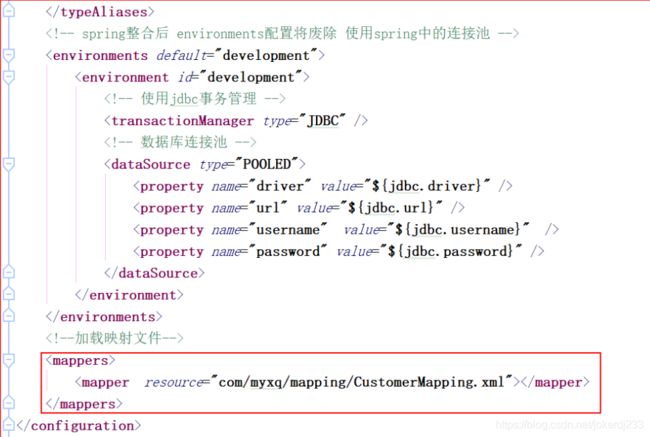
- < mapper class=" " />: 使用mapper接口类路径,此种方法要求mapper接口名称和mapper映射文件名称相同,且放在同一个目录中
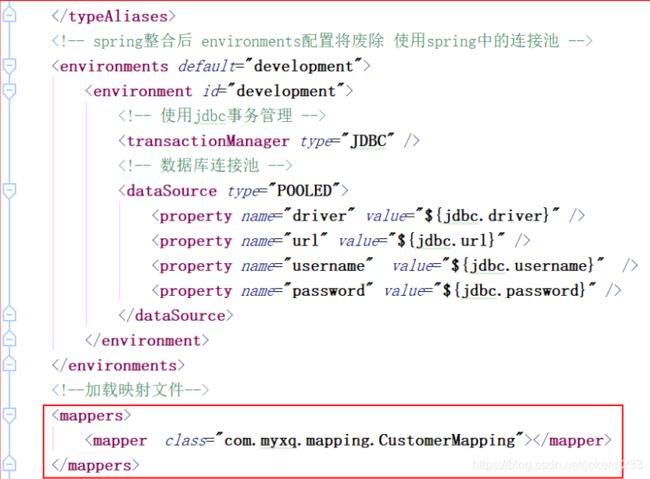

- < package name=""/>: 指定包下的所有mapper接口,此种方法要求mapper接口名称和mapper映射文件名称相同,且放在同一个目录中

输出类型
输出简单类型
Map
第1种形式:
key:是列名 value:是列名对应的值

第2种形式:
Map




resultMap
- 之有在写输出时使用的都是resultType
- 但是resultType要求必须得要字段名称和数据库当中的名称一致时才能有值,否则为null
- 如果sql查询字段名和pojo的属性名不一致,可以通过resultMap将字段名和属性名作一个对应关系
多表操作
ManyToOne
关系表

查询
分步查询
第一步 先查出所有的订单
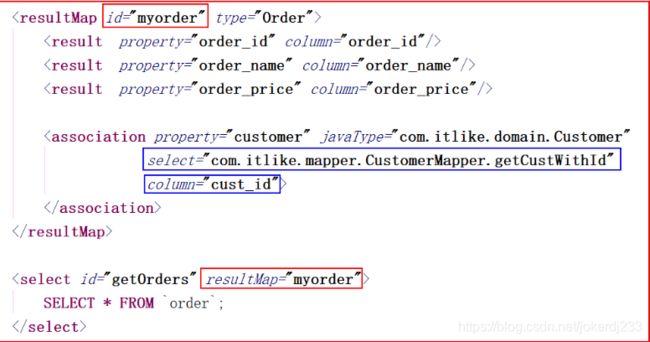
第二步 根据id查出对应客户

左连接查询
查询所有的订单及订单所对应的客户
左连接:把左边表的数据全部查出,右边表只查出满足条件的记录
应对sql
SELECT * FROM `order` as o LEFT JOIN customer as c on o.cus_id = c.cust_id;
建立domain

建立Mapping映射


测试
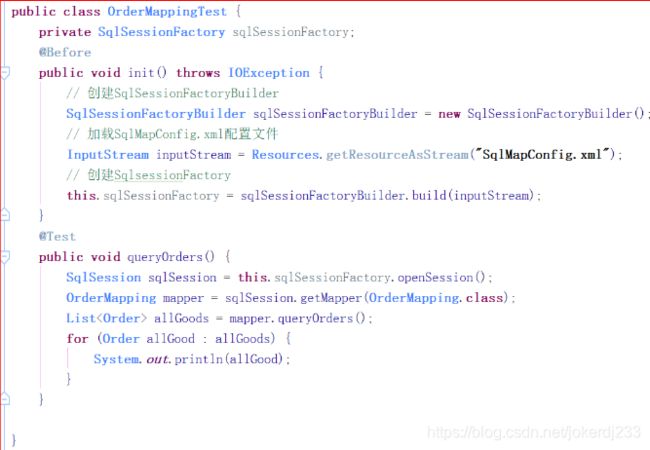
分部查询懒加载
<!--延迟加载的全局开关。当开启时,所有关联对象都会延迟加载。-->
<setting name="lazyLoadingEnabled" value="true"/>
<!--当开启时,任何方法的调用都会加载该对象的所有属性。否则,每个属性会按需加载-->
<setting name="aggressiveLazyLoading" value="false"/>
<!--指定哪个对象的方法触发一次延迟加载。-->
<setting name="lazyLoadTriggerMethods" value="equals,clone,hashCode"/>
OnToMany
SELECT * FROM customer as c LEFT JOIN `order` as o on c.cust_id = o.cust_id;
映射
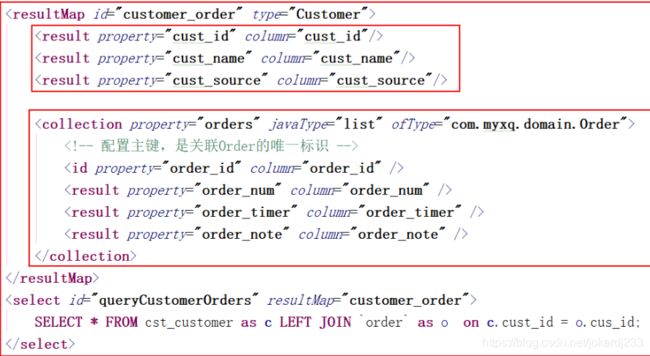
测试
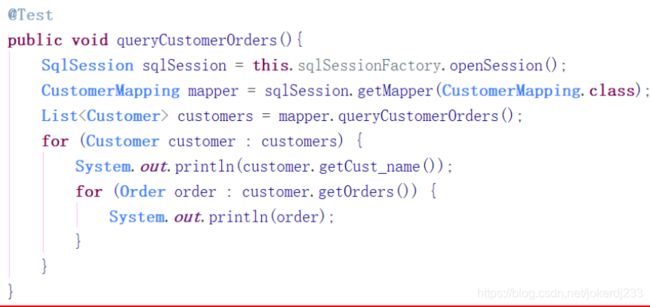
添加
保存数据



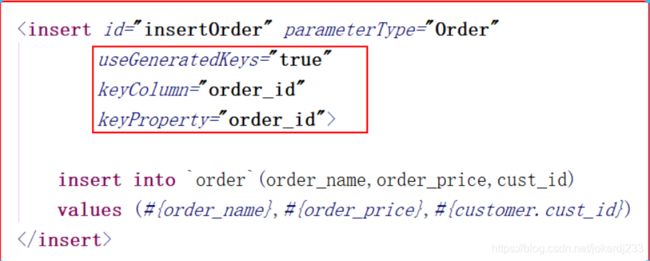
维护外键


管理关系

删除
删除时一定要先打破关系再做删除操作


ManyToMany
动态sql
什么是动态sql
通过mybatis提供的各种标签方法实现动态拼接sql。
. if标签
需求:根据客户名和级别查询客户

存在问题
有可能传入的名称或级别为空
可以使用if标签来进行判断
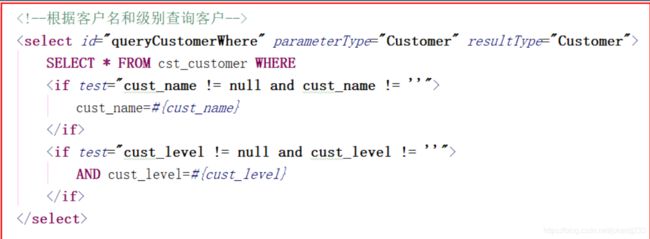
如果前一个条件这后,后面就会多一个and执行就会报错
Where标签
trim标签
choose标签
foreach标签
查询条件值为指定的值当中
给定的值可以以三种形式给出
数组:

List:


VO:
创建Vo

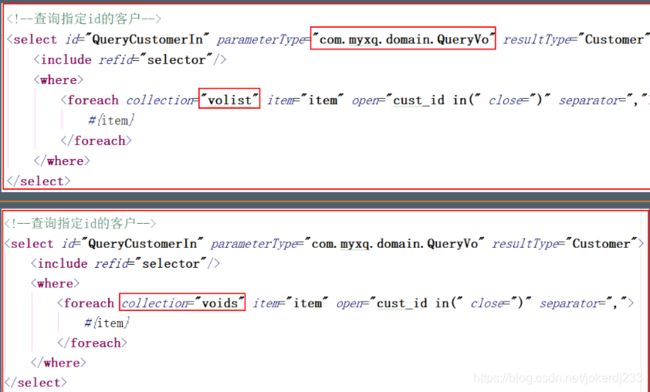
bind标签
Sql片段
Sql中可将重复的sql提取出来,使用时用include引用即可,最终达到sql重用的目的。

缓存
一级缓存
缓存介绍
- MyBatis中使用缓存来提高其性能。
- 当查询数据时, 会先从缓存中取出数据,如果缓存中没有,再到数据库当中查询
- MyBatis中的缓存分为两种:一级缓存和二级缓存
- 一级缓存是sqlSession级别的,二级缓存是mapper级别的
一级缓存
- 本地缓存 (默认开启)
- 在sqlSession没有关闭之前,再去查询时, 会从缓存当中取出数据,不会重新发送新的sql
一级缓存失效
- 如果在查询之前,执行了增\删\改 缓存就会失效
- 手动清空缓存
- 如果两次的查询条件不一样,缓存也会失效
- 如果两个查询在不同的sqlsession当中
二级缓存
二级缓存介绍
- 全局作用域缓存 一个namespace对应一个缓存
- 如果会话关闭,一级缓存的数据会被保存到二级缓存中
- 不同namespace查出的数据 ,会放到自己对应的缓存中
- 现在默认也是打开的
二级缓存使用步骤
-
- eviction:回收策略
- LRU(默认):最近最少使用,移除最长时间使用的对象
- FIFO:先进先出,俺对象进入缓存的顺序移除对象
- SOFT:软引入,移除基本垃圾回收器状态和软引入规则的对象
- WEAK:弱引入,移除基本垃圾回收状态和弱引入规则的对象
- flushInterval:刷新间隔,默认不清空
- readOnly:是否只读,
- true:告诉Mybatis是只读操作,不去修改数据,Mybatis为了加快获取速度,会直接将缓存的引用将给用, 不安全, 速度快
- false:非只读,有可能修改数据,Mybatis会利用序列化和反序列化复制一份给你 速度慢些
- size:可以存放多少个元素
- type:可以用来指定自定义的缓存
- eviction:回收策略
注意事项:
- 查询的数据都会先放到一级缓存当中
- 只有会话关闭,一级缓存中的数据才会转称到二级缓存中
缓存相关属性:
- cacheEnabled:只能控制二级缓存的开关
- select中useCache:控制的也是二级缓存是否使用
- 增删改标签中flushCache 一级和二级都会被清空 增删改flushCache默认为true 查询flushCache默认为false
- sqlSession.clearCache() 只清楚当前session的一级缓存
- localCacheScope:本地缓存作用域 取值:SESSION、STATEMENT、STATEMENT可以使用它禁用缓存
缓存使用顺序
- 先到二级缓存当中查找
- 如果二级缓存中没有,就去找一级缓存
- 如果一级缓存中也没有就去到数据库当中查询
逆向工程
MyBatis Generator
- 代码生成器
- 可以根据指定的表快速生成对应的映射文件,接口,以及Bean类
- 支持基本的增删改查,以及QBC风格的条件查询
- 但是一些复杂的表连接还是需要我们自己来去编写
使用
- 下载 https://github.com/mybatis/generator/releases
- 把相关jar导入到工程当中
- 创建generatorConfig.xml
<?xml version="1.0" encoding="UTF-8"?>
<!DOCTYPE generatorConfiguration
PUBLIC "-//mybatis.org//DTD MyBatis Generator Configuration 1.0//EN"
"http://mybatis.org/dtd/mybatis-generator-config_1_0.dtd">
<generatorConfiguration>
<!--
targetRuntime:设置自动生成的版本
MyBatis3:
MyBatis3Simple:简单增删改查
-->
<context id="DB2Tables" targetRuntime="MyBatis3">
<!--
不要生成日期和备注
-->
<commentGenerator>
<property name="suppressDate" value="true"/>
<property name="suppressAllComments" value="true" />
</commentGenerator>
<jdbcConnection driverClass="com.mysql.jdbc.Driver"
connectionURL="jdbc:mysql://localhost:3306/mybatis?characterEncoding=utf-8"
userId="root"
password="1234">
</jdbcConnection>
<!--
配置domain生成策略
targetProject:把自动生成的domian放在哪个工程里面
targetPackage:哪个包下
-->
<javaModelGenerator targetPackage="com.itlike.domain" targetProject=".\src">
<property name="enableSubPackages" value="true" />
<property name="trimStrings" value="true" />
</javaModelGenerator>
<!--
配置mapper的生成策略
targetPackage:把自动生成的mapper放在哪个工程里面
targetProject:哪个包下
-->
<sqlMapGenerator targetPackage="com.itlike.mapper" targetProject=".\src">
<property name="enableSubPackages" value="true" />
</sqlMapGenerator>
<!--
mapper接口生成策略
-->
<javaClientGenerator type="XMLMAPPER" targetPackage="com.itlike.mapper" targetProject=".\src">
<property name="enableSubPackages" value="true" />
</javaClientGenerator>
<table tableName="customer" domainObjectName="Customer" ></table>
<table tableName="teacher" domainObjectName="Teacher" ></table>
<table tableName="student" domainObjectName="Student" ></table>
</context>
</generatorConfiguration>
- 编写生成代码
List<String> warnings = new ArrayList<String>();
boolean overwrite = true;
File configFile = new File("./src/generatorConfig.xml");
ConfigurationParser cp = new ConfigurationParser(warnings);
Configuration config = cp.parseConfiguration(configFile);
DefaultShellCallback callback = new DefaultShellCallback(overwrite);
MyBatisGenerator myBatisGenerator = new MyBatisGenerator(config, callback, warnings);
myBatisGenerator.generate(null);
分页插件
-
下载分页插件
下载地址 -
配置分页插件
<plugins>
<plugin interceptor="com.github.pagehelper.PageInterceptor"></plugin>
</plugins>
- 使用分页插件
在查询之前设置分页
Page<Object> page = PageHelper.startPage(1, 5);
查询数据之后添加
PageInfo<Customer> pageInfo = new PageInfo<>(customers, 5);
属性介绍
System.out.println("当前页:"+pageInfo.getPageNum());
System.out.println("每页显示记录数:"+pageInfo.getPageSize());
System.out.println("总页数:"+pageInfo.getPages());
System.out.println("总记录数:"+pageInfo.getTotal());
System.out.println("是否有上一页:"+pageInfo.isHasPreviousPage());
System.out.println("是否有下一页:"+pageInfo.isHasNextPage());
System.out.println("导航页面:"+ Arrays.toString(pageInfo.getNavigatepageNums()));
SSM整合
spring与springMVC
- 创建web动态工程
- 导入spring包与配置文件
<dependencies>
<dependency>
<groupId>junitgroupId>
<artifactId>junitartifactId>
<version>4.11version>
dependency>
<dependency>
<groupId>mysqlgroupId>
<artifactId>mysql-connector-javaartifactId>
<version>5.1.46version>
dependency>
<dependency>
<groupId>com.mchangegroupId>
<artifactId>c3p0artifactId>
<version>0.9.5.2version>
dependency>
<dependency>
<groupId>javax.servletgroupId>
<artifactId>servlet-apiartifactId>
<version>2.5version>
dependency>
<dependency>
<groupId>javax.servlet.jspgroupId>
<artifactId>jsp-apiartifactId>
<version>2.2version>
dependency>
<dependency>
<groupId>javax.servletgroupId>
<artifactId>jstlartifactId>
<version>1.2version>
dependency>
<dependency>
<groupId>org.mybatisgroupId>
<artifactId>mybatisartifactId>
<version>3.5.1version>
dependency>
<dependency>
<groupId>org.mybatisgroupId>
<artifactId>mybatis-springartifactId>
<version>2.0.2version>
dependency>
<dependency>
<groupId>com.alibabagroupId>
<artifactId>druidartifactId>
<version>1.0.14version>
dependency>
<dependency>
<groupId>org.springframeworkgroupId>
<artifactId>spring-webmvcartifactId>
<version>5.2.0.RELEASEversion>
dependency>
<dependency>
<groupId>org.springframeworkgroupId>
<artifactId>spring-jdbcartifactId>
<version>5.1.9.RELEASEversion>
dependency>
<dependency>
<groupId>org.projectlombokgroupId>
<artifactId>lombokartifactId>
<version>1.16.10version>
dependency>
<dependency>
<groupId>com.alibabagroupId>
<artifactId>fastjsonartifactId>
<version>1.2.73version>
dependency>
dependencies>
applicationContext.xml
<beans xmlns="http://www.springframework.org/schema/beans"
xmlns:xsi="http://www.w3.org/2001/XMLSchema-instance"
xmlns:context="http://www.springframework.org/schema/context"
xmlns:aop="http://www.springframework.org/schema/aop"
xmlns:tx="http://www.springframework.org/schema/tx"
xsi:schemaLocation="http://www.springframework.org/schema/beans
http://www.springframework.org/schema/beans/spring-beans.xsd
http://www.springframework.org/schema/context
http://www.springframework.org/schema/context/spring-context.xsd
http://www.springframework.org/schema/aop
http://www.springframework.org/schema/aop/spring-aop.xsd
http://www.springframework.org/schema/tx
http://www.springframework.org/schema/tx/spring-tx.xsd
">
<context:component-scan base-package="com.dj"/>
<import resource="classpath:application-mybatis.xml"/>
<import resource="classpath:application-mvc.xml"/>
beans>
- 在web.xml当中配置spring监听器
<web-app xmlns="http://java.sun.com/xml/ns/javaee"
xmlns:xsi="http://www.w3.org/2001/XMLSchema-instance"
xsi:schemaLocation="http://java.sun.com/xml/ns/javaee
http://java.sun.com/xml/ns/javaee/web-app_3_0.xsd"
version="3.0"
metadata-complete="false">
<absolute-ordering/>
<display-name>web</display-name>
<welcome-file-list>
<welcome-file>index.html</welcome-file>
<welcome-file>index.htm</welcome-file>
<welcome-file>index.jsp</welcome-file>
</welcome-file-list>
<!--配置前端控制器-->
<servlet>
<servlet-name>SpringMVC</servlet-name>
<servlet-class>org.springframework.web.servlet.DispatcherServlet</servlet-class>
<init-param>
<param-name>contextConfigLocation</param-name>
<!--加载的主配置文件-->
<param-value>classpath*:applicationContext.xml</param-value>
</init-param>
<!-- 项目启动就加载框架 -->
<load-on-startup>1</load-on-startup>
</servlet>
<servlet-mapping>
<servlet-name>SpringMVC</servlet-name>
<url-pattern>/</url-pattern>
</servlet-mapping>
<filter>
<filter-name>CharacterEncoding</filter-name>
<filter-class>org.springframework.web.filter.CharacterEncodingFilter</filter-class>
<init-param>
<param-name>encoding</param-name>
<param-value>UTF-8</param-value>
</init-param>
<init-param>
<param-name>forceEncoding</param-name>
<param-value>true</param-value>
</init-param>
</filter>
<filter-mapping>
<filter-name>CharacterEncoding</filter-name>
<url-pattern>/*
<beans xmlns="http://www.springframework.org/schema/beans"
xmlns:xsi="http://www.w3.org/2001/XMLSchema-instance"
xmlns:context="http://www.springframework.org/schema/context"
xmlns:mvc="http://www.springframework.org/schema/mvc"
xsi:schemaLocation="http://www.springframework.org/schema/beans
http://www.springframework.org/schema/beans/spring-beans.xsd
http://www.springframework.org/schema/context
http://www.springframework.org/schema/context/spring-context.xsd
http://www.springframework.org/schema/mvc
http://www.springframework.org/schema/mvc/spring-mvc-4.0.xsd
">
<mvc:annotation-driven />
<mvc:default-servlet-handler/>
<context:component-scan base-package="com.dj.controller" />
<bean class="org.springframework.web.servlet.view.InternalResourceViewResolver">
<property name="prefix" value="/WEB-INF/jsp/"/>
<property name="suffix" value=".jsp"/>
bean>
beans>
添加Mybatis
添加Mybatis配置文件和数据库属性文件
sqlMapConfig.xml
<configuration>
<settings>
<setting name="logImpl" value="STDOUT_LOGGING"/>
settings>
<typeAliases>
<package name="com.myxq.domain" />
typeAliases>
configuration>
db.properties
jdbc.driver=com.mysql.jdbc.Driver
jdbc.url=jdbc:mysql://localhost:3306/mybatis?characterEncoding=utf-8
jdbc.username=root
jdbc.password=1234
创建Mapper
<mapper namespace="com.dj.mapper">
mapper>
- 在applicationContext配置文件中添加Mybatis数据库相关配置信息
application-mybatis.xml
<beans xmlns="http://www.springframework.org/schema/beans"
xmlns:xsi="http://www.w3.org/2001/XMLSchema-instance"
xmlns:context="http://www.springframework.org/schema/context"
xmlns:aop="http://www.springframework.org/schema/aop"
xmlns:tx="http://www.springframework.org/schema/tx"
xsi:schemaLocation="http://www.springframework.org/schema/beans
http://www.springframework.org/schema/beans/spring-beans.xsd
http://www.springframework.org/schema/context
http://www.springframework.org/schema/context/spring-context.xsd
http://www.springframework.org/schema/aop
http://www.springframework.org/schema/aop/spring-aop.xsd
http://www.springframework.org/schema/tx
http://www.springframework.org/schema/tx/spring-tx.xsd
">
<context:property-placeholder location="classpath:db.properties"/>
<bean id="dataSource" class="com.alibaba.druid.pool.DruidDataSource">
<property name="driverClassName" value="${jdbc.driver}" />
<property name="url" value="${jdbc.url}" />
<property name="username" value="${jdbc.username}" />
<property name="password" value="${jdbc.password}" />
bean>
<bean id="transactionManager"
class="org.springframework.jdbc.datasource.DataSourceTransactionManager">
<property name="dataSource" ref="dataSource" />
bean>
<tx:annotation-driven transaction-manager="transactionManager"/>
<bean id="sqlSessionFactoryBean" class="org.mybatis.spring.SqlSessionFactoryBean">
<property name="dataSource" ref="dataSource"/>
<property name="configLocation" value="classpath:sqlMapConfig.xml"/>
<property name="mapperLocations" value="classpath:mapper/**/*.xml"/>
bean>
<bean class="org.mybatis.spring.mapper.MapperScannerConfigurer">
<property name="basePackage" value="com.dj.mapper" />
bean>
beans>
SSM配置文件总结
pom.xml
<dependencies>
<dependency>
<groupId>junitgroupId>
<artifactId>junitartifactId>
<version>4.11version>
dependency>
<dependency>
<groupId>mysqlgroupId>
<artifactId>mysql-connector-javaartifactId>
<version>5.1.46version>
dependency>
<dependency>
<groupId>com.mchangegroupId>
<artifactId>c3p0artifactId>
<version>0.9.5.2version>
dependency>
<dependency>
<groupId>javax.servletgroupId>
<artifactId>servlet-apiartifactId>
<version>2.5version>
dependency>
<dependency>
<groupId>javax.servlet.jspgroupId>
<artifactId>jsp-apiartifactId>
<version>2.2version>
dependency>
<dependency>
<groupId>javax.servletgroupId>
<artifactId>jstlartifactId>
<version>1.2version>
dependency>
<dependency>
<groupId>org.mybatisgroupId>
<artifactId>mybatisartifactId>
<version>3.5.1version>
dependency>
<dependency>
<groupId>org.mybatisgroupId>
<artifactId>mybatis-springartifactId>
<version>2.0.2version>
dependency>
<dependency>
<groupId>com.alibabagroupId>
<artifactId>druidartifactId>
<version>1.0.14version>
dependency>
<dependency>
<groupId>org.springframeworkgroupId>
<artifactId>spring-webmvcartifactId>
<version>5.2.0.RELEASEversion>
dependency>
<dependency>
<groupId>org.springframeworkgroupId>
<artifactId>spring-jdbcartifactId>
<version>5.1.9.RELEASEversion>
dependency>
<dependency>
<groupId>org.projectlombokgroupId>
<artifactId>lombokartifactId>
<version>1.16.10version>
dependency>
<dependency>
<groupId>com.alibabagroupId>
<artifactId>fastjsonartifactId>
<version>1.2.73version>
dependency>
dependencies>
web.xml
<web-app xmlns="http://java.sun.com/xml/ns/javaee"
xmlns:xsi="http://www.w3.org/2001/XMLSchema-instance"
xsi:schemaLocation="http://java.sun.com/xml/ns/javaee
http://java.sun.com/xml/ns/javaee/web-app_3_0.xsd"
version="3.0"
metadata-complete="false">
<absolute-ordering/>
<display-name>webdisplay-name>
<welcome-file-list>
<welcome-file>index.htmlwelcome-file>
<welcome-file>index.htmwelcome-file>
<welcome-file>index.jspwelcome-file>
welcome-file-list>
<servlet>
<servlet-name>SpringMVCservlet-name>
<servlet-class>org.springframework.web.servlet.DispatcherServletservlet-class>
<init-param>
<param-name>contextConfigLocationparam-name>
<param-value>classpath*:applicationContext.xmlparam-value>
init-param>
<load-on-startup>1load-on-startup>
servlet>
<servlet-mapping>
<servlet-name>SpringMVCservlet-name>
<url-pattern>/url-pattern>
servlet-mapping>
<filter>
<filter-name>CharacterEncodingfilter-name>
<filter-class>org.springframework.web.filter.CharacterEncodingFilterfilter-class>
<init-param>
<param-name>encodingparam-name>
<param-value>UTF-8param-value>
init-param>
<init-param>
<param-name>forceEncodingparam-name>
<param-value>trueparam-value>
init-param>
filter>
<filter-mapping>
<filter-name>CharacterEncodingfilter-name>
<url-pattern>/*url-pattern>
filter-mapping>
web-app>
application-mvc.xml
<beans xmlns="http://www.springframework.org/schema/beans"
xmlns:xsi="http://www.w3.org/2001/XMLSchema-instance"
xmlns:context="http://www.springframework.org/schema/context"
xmlns:mvc="http://www.springframework.org/schema/mvc"
xsi:schemaLocation="http://www.springframework.org/schema/beans
http://www.springframework.org/schema/beans/spring-beans.xsd
http://www.springframework.org/schema/context
http://www.springframework.org/schema/context/spring-context.xsd
http://www.springframework.org/schema/mvc
http://www.springframework.org/schema/mvc/spring-mvc-4.0.xsd
">
<mvc:annotation-driven />
<mvc:default-servlet-handler/>
<context:component-scan base-package="com.dj.controller" />
<bean class="org.springframework.web.servlet.view.InternalResourceViewResolver">
<property name="prefix" value="/WEB-INF/JSP/"/>
<property name="suffix" value=".jsp"/>
bean>
beans>
application-mybatis.xml
<beans xmlns="http://www.springframework.org/schema/beans"
xmlns:xsi="http://www.w3.org/2001/XMLSchema-instance"
xmlns:context="http://www.springframework.org/schema/context"
xmlns:aop="http://www.springframework.org/schema/aop"
xmlns:tx="http://www.springframework.org/schema/tx"
xsi:schemaLocation="http://www.springframework.org/schema/beans
http://www.springframework.org/schema/beans/spring-beans.xsd
http://www.springframework.org/schema/context
http://www.springframework.org/schema/context/spring-context.xsd
http://www.springframework.org/schema/aop
http://www.springframework.org/schema/aop/spring-aop.xsd
http://www.springframework.org/schema/tx
http://www.springframework.org/schema/tx/spring-tx.xsd
">
<context:property-placeholder location="classpath:db.properties"/>
<bean id="dataSource" class="com.alibaba.druid.pool.DruidDataSource">
<property name="driverClassName" value="${jdbc.driver}" />
<property name="url" value="${jdbc.url}" />
<property name="username" value="${jdbc.username}" />
<property name="password" value="${jdbc.password}" />
bean>
<bean id="transactionManager"
class="org.springframework.jdbc.datasource.DataSourceTransactionManager">
<property name="dataSource" ref="dataSource" />
bean>
<tx:annotation-driven transaction-manager="transactionManager"/>
<bean id="sqlSessionFactoryBean" class="org.mybatis.spring.SqlSessionFactoryBean">
<property name="dataSource" ref="dataSource"/>
<property name="configLocation" value="classpath:sqlMapConfig.xml"/>
<property name="mapperLocations" value="classpath:mapper/**/*.xml"/>
bean>
<bean class="org.mybatis.spring.mapper.MapperScannerConfigurer">
<property name="basePackage" value="com.dj.mapper" />
bean>
beans>
applicationContext.xml
<beans xmlns="http://www.springframework.org/schema/beans"
xmlns:xsi="http://www.w3.org/2001/XMLSchema-instance"
xmlns:context="http://www.springframework.org/schema/context"
xmlns:aop="http://www.springframework.org/schema/aop"
xmlns:tx="http://www.springframework.org/schema/tx"
xsi:schemaLocation="http://www.springframework.org/schema/beans
http://www.springframework.org/schema/beans/spring-beans.xsd
http://www.springframework.org/schema/context
http://www.springframework.org/schema/context/spring-context.xsd
http://www.springframework.org/schema/aop
http://www.springframework.org/schema/aop/spring-aop.xsd
http://www.springframework.org/schema/tx
http://www.springframework.org/schema/tx/spring-tx.xsd
">
<context:component-scan base-package="com.dj"/>
<import resource="classpath:application-mybatis.xml"/>
<import resource="classpath:application-mvc.xml"/>
beans>
db.properties
jdbc.driver=com.mysql.jdbc.Driver
jdbc.url=jdbc:mysql://localhost:3306/ssm?useUnicode=true&characterEncoding=utf-8&useSSL=false&serverTimezone=UTC
jdbc.username=root
jdbc.password=123456
sqlMapConfig.xml
<configuration>
<settings>
<setting name="logImpl" value="STDOUT_LOGGING"/>
settings>
<typeAliases>
<package name="com.dj.entity" />
typeAliases>
configuration>





